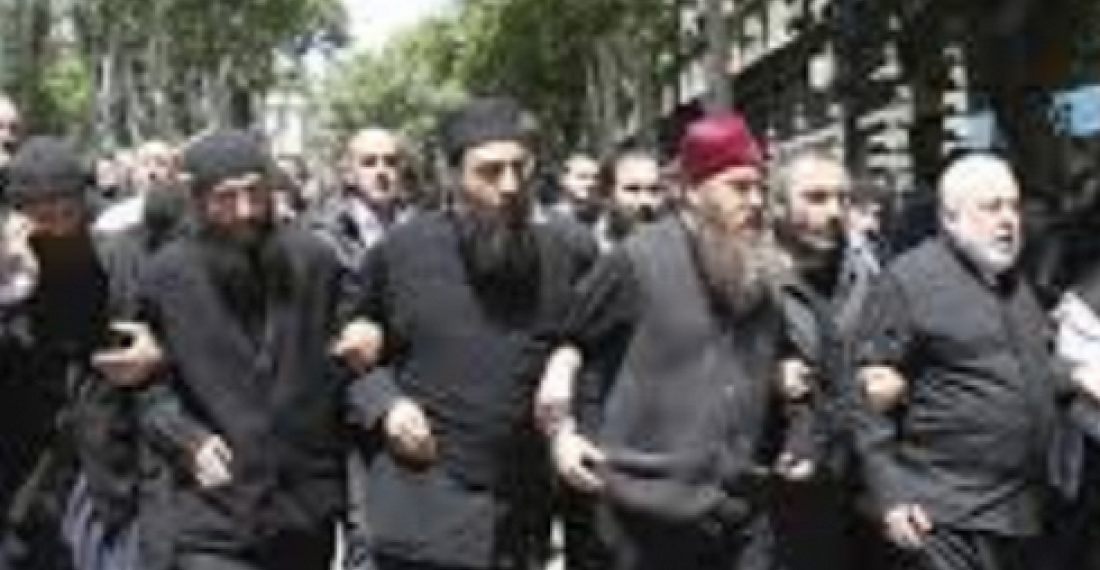There has been a huge outcry from international quarters, as well as within Georgian society, following the violent break-up by a mob led by Orthodox Priests of a small peaceful rally marking the International Day against Homophobia in the Georgian capital Tbilisi. Participants in the rally, that was also attended by a number of foreign diplomats, had to be evacuated after the police nearly lost control of the situation. The Georgian government has condemned the violence and has promised an investigation but as yet nobody has been arrested.
Six leading Georgian civil society organisations have issued a toughly worded statement criticisng the government's handling of the events. The statement, issued by Transparency International Georgia; Georgian Democratic Initiative (GDI); Human Rights Education and Monitoring Center (EMC); Georgian Young Lawyers' Association; Article 42 of the Constitution of Georgia and the International Society for Fair Elections and Democracy (ISFED) says:
"On May 17, the state failed to secure the area designated for the pre-arranged rally on International Day Against Homophobia and Transphobia. This is an infringement of the rally participants' freedom of assembly and demonstration.
The measures which had been put in place by the police to ensure the safety of the rally participants were both inadequate and ineffective. They failed to withstand the number and unrestrained behaviour of the counter-demonstrators.
According to information and material provided by our observers, counter-demonstrators faced no resistance when they came to break down the cordon. Having given a group of Orthodox clergy priests (who represented the counter-demonstrators) an opportunity to enter the scheduled anti-homophobia rally, the police were then unable to stem the flow of activists who followed them.
The mass of counter-demonstrators started aggressively moving towards the rally participants and proceeded to occupy the space allocated for the rally. Only a few rally participants managed to escape the scene safely.
At this stage we can make the initial assessment and state the following:
■ The Ministry of Interior failed to adequately assess the potential risks posed by the counter-demonstrators, and failed to prepare a suitable safety strategy. It was clear from the start that the number of police mobilized would be inadequate, and that the measures prepared against the offenders would have no effect;
■ The police were uncoordinated and unable to protect the citizens' freedom of expression. Furthermore, it seemed that the Ministry of Interior's focus was on the safe removal of the rally participants from the area rather than protecting the rally itself. The police did not make enough effort to ensure the safety of the rally participants throughout the demonstration;
■ As soon as the rally territory was occupied by the counter-demonstrators, the police simply stood back. This gave the counter-demonstrators freedom to behave aggressively and increased their opportunities to harass individual rally participants; an occurrence which unfortunately happened far too often;
■ Most alarming is the attitude of police officers towards the participants of the planned rally on the Day Against Homophobia and Transphobia. All our observers affirmed that the police officers frequently referred to the rally participants in a cynical and insulting manner and were seen sympathizing with the counter-demonstrators. This attitude was also evident in their general behavior.
At this point thousands of counter-demonstrators were still swarming the streets, marking themselves out by their patent aggression towards those they identified with the initial rally. The police force once again failed here, and limited their actions to simply diffusing various incidents of aggression.
Based on all of the above, we call on the Ministry of Interior to:
■ Immediately undertake effective measures for securing public order and the safety of citizens;
■ Hold all those officials responsible who failed to adequately assess the existing risks, and bring to justice those who did not ensure the safety of the rally participants and their right to assembly and demonstrate;
■ Investigate and bring to account all those who prevented the citizens from holding the planned rally on the Day Against Homophobia and Transphobia, who resorted to violence against those with different views and insulted them both verbally and physically.
Observer organizations shall monitor these developments and will provide the public with more information and assessments at a later date."
There have been statements of condemnation from the European Union, the United States and other governments and international organisations. The Foreign Minister of the Netherlands summed up the international outrage, "It is unacceptable, particularly on the International Day against Homophobia, that lesbians, gays, bisexuals and transgenders cannot exercise their fundamental rights, like the right to free expression and peaceful demonstration," said Dutch Foreign Minister Frans Timmermans, who expressed "shock" over the violence in Tbilisi.
"The Netherlands, together with other EU countries, will continue to remind the Georgian authorities that the Georgian police are obliged to respect the rights of these individuals," he said. The Dutch government said in a press release that it summoned the Georgian ambassador on May 17, following violence in downtown Tbilisi; it also says that defending LGBT rights is one of the cornerstones of Dutch human rights policy.
Commonspace.eu political editor said in a comment
"The incidents on 17 May highlighted more deep-rooted problems of intolerance and religious fundamentalism in Georgian society. Whilst the Georgian Orothodox church remains an important symbol of Georgian statehood, it has remained largely caught in a time warp , unreformed since the middle ages. The incidents have now put the church in the spotlight.
Observers also think that the size and the character of the protests indicates that it was a well-planned and resourced operation, likely aimed at distabilising the new government of Bidhzina Ivanishvili which has been going to great lengths to promote human rights issues but which now finds itself caught between a rock and a hard place."
source: commonspace.eu with CEW and agencies.







